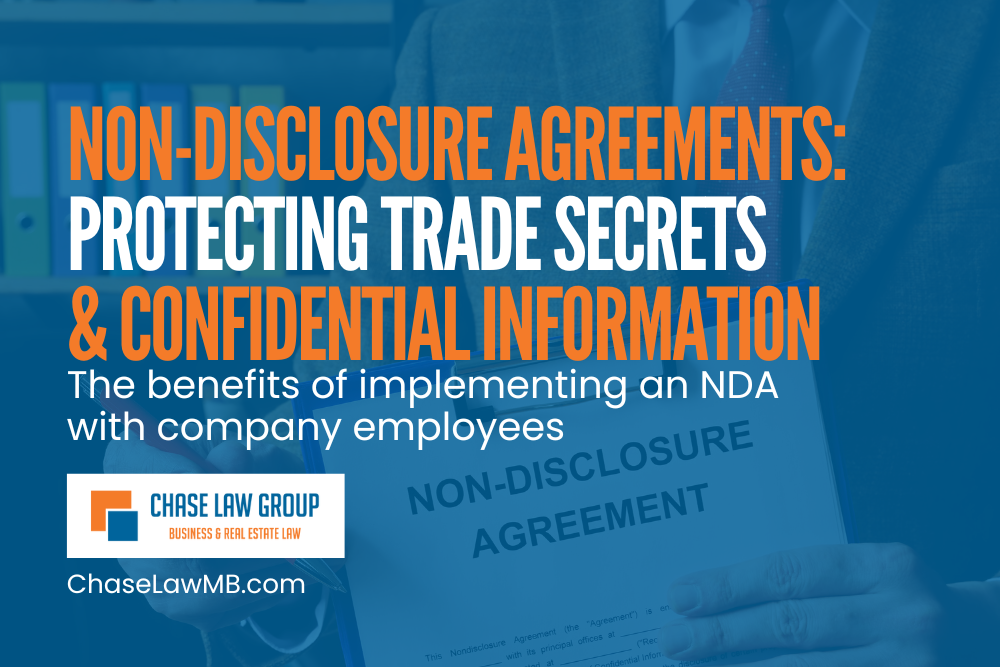Non-Disclosure Agreements: Protecting Your Company’s Trade Secrets and Confidential Information
By Admin April 29, 2024 Category: Employment Tags: business attorney business law business protection california employment law california law chase law manhattan beach Confidentiality Corporate Security Data Protection deann chase Employee Education employment attorney employment law Intellectual Property Legal Compliance los angeles business attorney NDA Guidance small business law Trade Secrets Workplace Confidentiality

Virtually every company has developed product details, such as recipes or processes of manufacturing, or even customer purchasing information that it wants to protect from disclosure to competitors and the public. To protect this critical data, which would be considered trade secrets or confidential information, depending on the nature of the information, companies must take key steps to ensure it is not taken by employees whether intentionally or inadvertently. A Non-Disclosure Agreement (NDA) also referred to as a Confidential Information and Inventions Agreement, is an effective and necessary tool which both notifies employees of what the company considers its trade secrets and confidential information as well as prohibits disclosure by employees of this key information. The following article sets forth how a well-drafted NDA is a powerful tool that all companies should implement and the benefits that it can provide to an organization.
Protection of company trade secrets and other confidential information
Through the use of a well-drafted NDA, a company can inform employees what the company considers its trade secrets and confidential information, including client private information. The NDA will notify employees that the company’s trade secrets and confidential information are not to be taken and/or disclosed to anyone outside the organization. Moreover, the NDA will prohibit the use of trade secrets and confidential information once their employees leave the organization. By clearly setting forth this prohibition in an NDA, employers can take necessary steps through the court and/or arbitration (see below) to recover and prevent anyone from using their trade secrets and confidential information. Note that in addition to use of the NDA, companies must maintain and otherwise treat the data in a manner that protects it, such as limited access and use by employees.
Ensuring company property and documents are returned at the conclusion of employment
An effective NDA confirms that company property including computers, phones and other hardware provided to employees is company property and must be only used for company business and be returned to the company upon separation of employment. Additionally, employees must be informed that company documents, including those accessible via computer are company property and also must be returned and not used upon separation.
Inventions created during their employment are company property
A comprehensive NDA will set forth that inventions created by the employee on company time, using company information and equipment are the property of the company. This language ensures that anything invented by the employee during their employment is company property.
Provides remedies for disputes
An NDA should include how any disputes related to the information protected by the NDA will be resolved including mandatory mediation and arbitration, as well as that injunctive relief, such as temporary and permanent restraining orders, can separately be obtained through the courts. This ensures that judicial orders can be obtained to prevent the use of the trade secrets and that litigation will be conducted confidentiality to avoid further disclosure of trade secrets and confidential information.
Although non-compete language is prohibited, employees can be prevented from using trade secrets
California prohibits the enforcement of entering into as well as enforcing non-compete agreements with employees. Click here to learn more about non-compete agreements. Notwithstanding this prohibition, employers can prevent and take legal action if former employees take and use company confidential and trade secret information, whether or not in competition with the company. Through an NDA, employers can notify their employees that the use of trade secrets in any manner, including to compete is prohibited.
Every company should have a NDA executed by their employees to ensure that the company’s trade secrets and confidential information are protected. If you have questions regarding NDA’s or would like assistance in implementing one at your organization, contact Chase Law Group to set up a consultation or call 310.545.7700.
Need help implementing a Non-Disclosure Agreement with Your Employees?
www.chaselawmb.com
Contact Chase Law Group today
Please note that this article is for informational purposes only and should not be considered legal advice. It is recommended to consult with an attorney for specific legal guidance pertaining to your business and its practices.

